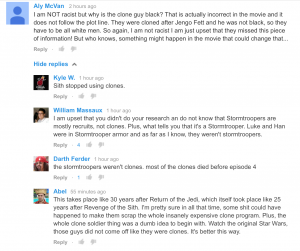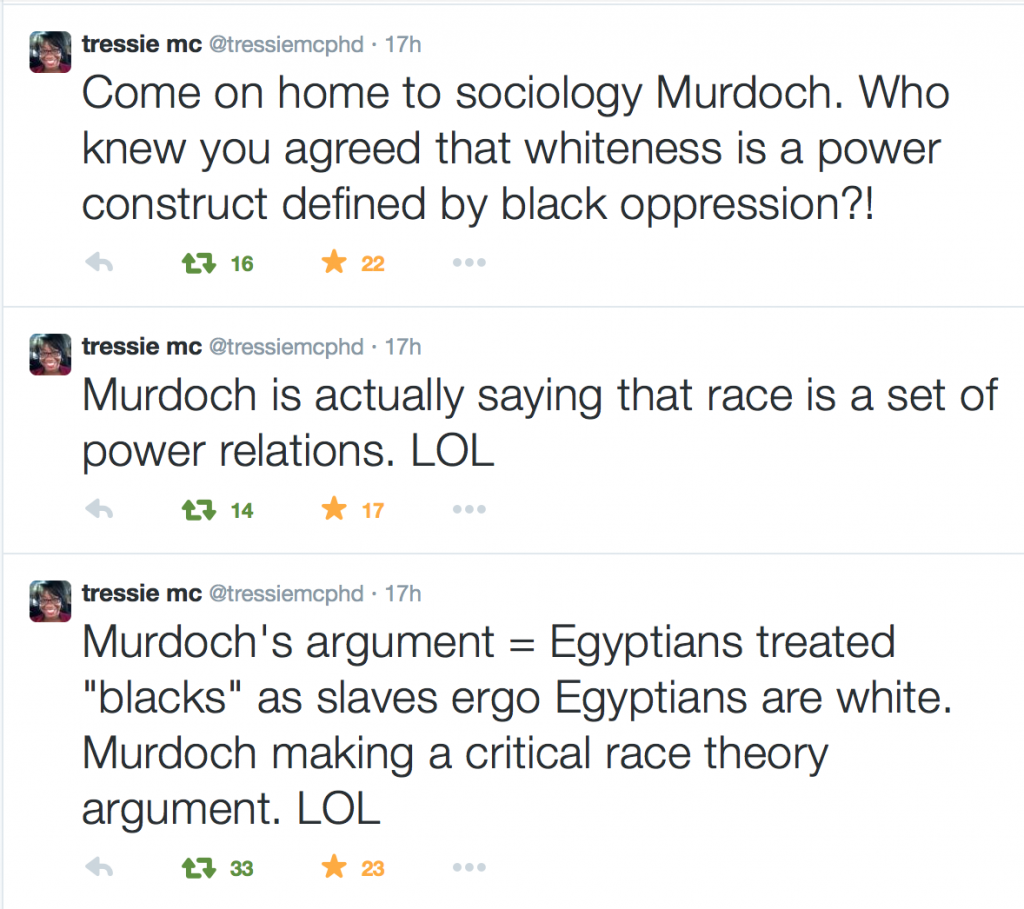Can an Imperial Stormtrooper be black? Can ancient Egyptians be white?
Hey, in the movies, anything is possible – though some things are perhaps more possible than others.
A filmmaker telling a story drawn from an entirely fictional imaginary can probably take all kinds of liberties with characters (not to mention settings, props, special effects, etc.) But a filmmaker telling a story drawn from an imaginary that is based (however loosely) upon a set of canonical texts has to be much more careful about violating the sensibilities and expectations of the audience.
So of course it’s easier for Ridley Scott to get away with a Biblical epic about the Exodus story featuring an all-white lead cast than it is for J.J. Abrams to get away with a 90-second Star Wars movie trailer depicting one black Stormtrooper.
As you can see from the above-linked Atlantic piece, or from the comments section beneath the YouTube video of the Star Wars trailer, much virtual ink has been spilled trying to address the question of whether it is possible – possible within the canonical story arc of Star Wars (a story arc informed but not bound by the stories comprising the expanded universe of Star Wars) — for there to be such a person as a black Stormtrooper.
Here are some examples of such discussions, screengrabbed this morning from the YouTube comment thread (click any image to enlarge):
According to these commenters, it’s not about race; it’s about fidelity to the received narrative. It’s about canonicity. (And what is canonicity about? Is Star Wars canonicity circa 2014 about something different than, say, Western Civ canonicity circa 1988?)
Meanwhile, speaking of canonical texts — as in, the Bible — Rupert Murdoch has come to the defense of Ridley Scott’s casting choices for Exodus: Gods and Kings. Yesterday the media mogul addressed the Twitterverse: “Moses film attacked on Twitter for all white cast,” he wrote. “Since when are Egyptians not white? All I know are.” (Since when are Egyptians not white? Well, that’s an interesting question — an historical question, even.)
So Murdoch addressed the Twitterverse, and the Twitterverse, as is its wont, talked back; you can read various responses to Murdoch’s initial tweet (and to his doubling-down-and-digging-the-hole-deeper follow-up tweets) in these stories.
One of the best responses I saw to Murdoch’s tweets came from Tressie McMillan Cottom
That’s an astute (and funny) reading of the (unacknowledged) logic of Murdoch’s argument.
In a way, Murdoch’s argument is an argument about canonicity. Murdoch asks, “Since when are Egyptians not white?” I suppose a corollary question might be, “Since when has Western Civilization been white?” (Spoiler: since the 1780s.)
As far as canonicity goes, Scott’s film is in no danger, and poses no danger. And that’s likely to be the biggest problem for his bottom line. Oh, he may be taking liberties in his presentation of the Biblical story of the Exodus. But that’s Hollywood, and the Bible is not the canon that matters there. Blackness matters — the blackness of the bottom line. And this explains Scott’s utterly conventional casting choices. He said as much himself: “I can’t mount a film of this budget, where I have to rely on tax rebates in Spain, and say that my lead actor is Mohammad so-and-so from such-and-such. I’m just not going to get it financed.” The film’s only hope as a box-office draw looks to be its potential to wow the crowds with some (possibly) stunning CGI. But that’s Hollywood too — very much by the book. Indeed, as far as the conventions of Tinseltown go, Scott’s film looks like it will fit very securely — perhaps even forgettably? — into the filmic canon of Big-Budget Blockbuster Biblical Epics featuring melodramatic over-acting, the very latest in special effects, and a (mostly white) cast of (now virtual) thousands. I suspect this is a movie we’ve seen before, and I’m not so sure that we’ll all flock to see it again.
But I’m pretty sure that the Star Wars film will clear a profit at the box office mighty fast, canon be honored or canon be damned. And if those who are bothered by the idea of a black Stormtrooper for whatever reason (and I’m sure the concern is purely canonical) will just stay home, then those fans whose hearts beat a little faster at the very thought of seeing Han Solo on the screen again can get a better seat, again and again.
Whoever those fans are.
http://youtu.be/sO-KR-14uXM
Lordamercy!
::swoon::






11 Thoughts on this Post
S-USIH Comment Policy
We ask that those who participate in the discussions generated in the Comments section do so with the same decorum as they would in any other academic setting or context. Since the USIH bloggers write under our real names, we would prefer that our commenters also identify themselves by their real name. As our primary goal is to stimulate and engage in fruitful and productive discussion, ad hominem attacks (personal or professional), unnecessary insults, and/or mean-spiritedness have no place in the USIH Blog’s Comments section. Therefore, we reserve the right to remove any comments that contain any of the above and/or are not intended to further the discussion of the topic of the post. We welcome suggestions for corrections to any of our posts. As the official blog of the Society of US Intellectual History, we hope to foster a diverse community of scholars and readers who engage with one another in discussions of US intellectual history, broadly understood.
First off, thanks for this timely post. There’s been a lot of talk in recent years about race, gender, and science fiction–which makes sense, because it’s a genre that, I think , allows for a great deal of creative thinking about identity, whether it’s on Earth, Vulcan, Tatooine, or Krypton (sorry for crossing the science fiction streams there, but you get what I’m saying).
Now I think one element that’s interesting about the Black stormtrooper debate is, quite simply, WE HAVE NO IDEA WHAT JOHN BOYEGA IS DOING IN THE MOVIE. So, as with most nerd speculation about a teaser trailer, it’s nothing more than digital sound and fury, signifying the usual nerd rage–i.e. nothing. But what you indicate above, and what others have talked about on line too–is how this indicates some of the long-running debates among science fiction fans about race in some of our beloved stories.
I admit to some bias here–as a child, I was thrilled to see guys like Lando Calrissian, Benjamin Sisko, and John Henry Irons beating the bad guys and saving the day. And in real life I marveled at real-life heroes like Guion S. Bluford and Mae C. Jemison. I suppose I’ve just never understood this sort of backlash to seeing more characters of color in our favorite movie franchises. (In fact, one of these days I’m going to do a blog post about African American fictional heroes and debates about race in the 1990s. One day.)
And don’t get me started on the clones/Stormtroopers thing. Like I said before, the movie will explain this, I’m sure.
I doubt most (if any) on this blog are watching Star Wars: Rebels, but a few weeks ago the show introduced a black stormtrooper recruit. Since Rebels is produced by Disney it is supposed to be conical (similar to Star Wars: Clone Wars). Here is an article that may tie the show and movie together.
http://www.mtv.com/news/1986456/star-wars-rebels-leonis/
I find it odd though, that in science fiction, which allows for green skin, tentacles, sarlaccs, wookiess, ewoks, etc., that the slightest perceived diversity shown by a main charter throws people into a tizzy. Similar to the Bible the Star Wars cannon is not consistent. There are major discrepancies within the original movies, let allow between the various franchises, books, made for TV movies, DVDs, comics, etc. I don’t think that internet comments reflect the views of the wider public, regarding Star Wars or anything else, particularly on large open anonymous forums like YouTube or Twitter. Rather, the criticisms of the trailer seem to be from self styled prophets, who alone out of everyone in existence, have the key interpretation of the cannon.
Thanks for the kind words about the post, Robert. But you know what can happen when you cross the streams! Total protonic reversal..
I know this is an awfully light-hearted post for heavy-hearted times. This present round of sound and fury about blackness in the make-believe world(s) of Hollywood is happening alongside/against/within these heart-wrenching (and often maddening) conversations about blackness in the all-too-real world of 21st century America. I figured our readers are aware enough of that context that I wouldn’t need to spell it out — but maybe I should have.
Rhett,
I confess to having watched the first two episodes of “Star Wars: Rebels.” My buddy calls it “Star Wars: Aladdin” because he thinks Ezra is rendered very much like the Disney character. (An ominous sign, perhaps.) But I’m not much worried about what is “canonical” for this franchise. I’m headed to the movies to see a new Star Wars flick, and couldn’t be happier about that. The story can go wherever it likes as far as I’m concerned, as long as it’s good. The first new Star Trek movie gave that whole franchise a reboot, and brilliantly so — if the new Star Wars film could find a way to convince us that Jar Jar Binks had never happened, I wouldn’t complain.
On the whole notion of canon, I find it fascinating to compare this current conversation about canonicity in the world of SW fandom to debates about the Biblical canon in church history. The recent decision about the non-canoical status of the EU texts reads like a conciliar (as in, Church council) or even papal proclamation, and one very much concerned with pastoral care for those who revere the now-demoted texts. The “creatives” at Disney are doing their best to reassure fans who’ve invest a lot intellectually/emotionally into the “truth” of the EU that they will draw upon the EU whenever possible to enhance the story they are telling. The EU texts have become like the Apocrypha or Deuterocanonical books of, say, Anglicanism — edifying, but not inspired.
And of course it’s also interesting to see how a defense of “the canon,” or appeals to “the canon,” can function as a proxy for discussions of who belongs and who doesn’t — who belongs in the story we’re told, who belongs in the stories we tell. That’s one place where I think 1988 and 2014 are strikingly similar — but that’s certainly not to say I think they’re the same.
That said, Ridley Scott would have been much better off commercially, never mind artistically, if he had put some thought into troubling the waters of canonical-Hollywood-Biblical-epic-whiteness a little bit in this film. I can totally understand why he would cast Sigourney Weaver as Tuya. But other than that, his choices seem a little bland. Now, if he had been able to cast, say, Idris Elba as Rameses — or, better yet, as Moses — well, that would have been a movie.
I don’t really follow Hollywood (haven’t been to see a movie in quite a while, don’t subscribe to Netflix. etc.), but I can’t help thinking Ridley Scott would have been well-advised not to make an Exodus movie at all. Is there really a need for yet another Biblical epic? Hasn’t virtually everyone seen, at one point or another, a TV version of Charlton Heston in The Ten Commandments, and if a director is not going to bother updating the cast (in terms of diversity, at least), why bother? Hasn’t Ridley Scott already made enough money to do something more interesting? (I don’t know anything about his personal circumstances or his artistic proclivities, except for Blade Runner, which was pretty good, as I recall.) The whole idea of another Exodus movie just seems like a waste of time and money to me, though of course, as we say in the blogosphere, YMMV.
I just went to the movies most recently to see Interstellar — absolutely loved it. Give it a try.
On Scott, he did Alien, and of course Gladiator — his first foray into swords and sandals, I believe. But yeah — this is exactly what I’m thinking on Exodus. It looks like it’s going to be a remake of sorts of The Ten Commandments. I didn’t go see the Noah film with Russell Crowe, and haven’t checked to see how it did, but IIRC it wasn’t a big hit.
Scott’s last big budget effects film, as far as I can recall, was Prometheus, which is kind of a prequel to the Alien franchise. If the studios/backers were leery of fronting him a bunch of money for a Biblical epic, it probably has more to do with how Prometheus fared than the familiarity of his Exodus cast. Practically everything has eye-popping CGI now, so CGI and a comfortably familiar cast is just not enough these days, it seems to me. Story, character, vision — those have to be big enough to match that budget, or it’s gonna flop.
Sadly for Alien fans, Prometheus was god awful, which probably presages the making of Exodus (a movie that I will never pay to see). I am one of those who thinks that Scott sold his soul to the devil and hasn’t made a good movie since Thelma and Louise (I found Gladiator to be too silly and left the theater after an hour).
Truth is a movie like Exodus is a great sell–and since it’s Hollywood, it’s all about selling, as Scott’s own words tell us. The theme always creates a big hoopla, think of Scorcese’s controversial depiction of Christ’s “sins” in The Last Temptation of Christ (and the casting of Willem Dafoe as Jesus), the Mel Gibson sadomasochistic ordeal, and Noah’s fantasy elements. 2 Christian movies not associated with the Hollywood, God is not Dead and the Son of God, did extremely well at the box office.
Btw, there are plenty of Hollywood movies that still do great at the box office without a decent story or vision. Michael Bay and the Transformers series are proof of this. I will go see Interstellar, but I am not sold on Christopher Nolan’s midbrow metaphysics. And yes, I am a film snob, thank you very much. 🙂
Well, here’s the box office recap for Prometheus — okay in the U.S., better overseas, pretty good overall/eventually. Prometheus: Box-office.
So maybe Scott — whose production budget for Exodus looks to be in the same ball park — can deliver a middling epic that will clear an acceptable profit. But I’ve got a bad feeling about this.
Kahlil, you crack me up! Thanks for chiming in. (And sorry to reply downthread — you know how I am about nested comments.)
If there has been controversial buzz about Exodus, I’ve missed it. I know there was enough pre-release grousing about Noah that they added a disclaimer about the liberties they were taking with the text. But I wasn’t aware that Scott was facing even that level of blowback. He *wishes* he’d made some bold casting calls — or the artist in him does, surely. But I’m kind of with Louis above — surely Scott could be doing more interesting things now?
FWIW, I did not leave Gladiator an hour in. In my book, that was a movie well worth the time/price of admission. And definitely one to see on the big screen.
You’re right about the commercial draw of Transformers. However, those movies are aimed squarely and smartly at an 8-23 year old demographic (I made that spread up on the spot, but surely it’s close) and to that demographic’s parents, who will buy all the tie-in merchandise — the toys, the video games, what have you. No need to spend much money on story or talent with that kind of formula — blow it all on CGI and wait for the cash to roll in. I can’t tell who Exodus is aimed at, but surely the audience will skew older — 35 and above? I guess grandma and grandpa might take the kiddos to the movies to see the ten plagues in living color, but I’m just not seeing how this flick is going to gather steam after the initial opening. Maybe just no CGI competition for a few weeks?
I understand your caution about Interstellar. I thought Inception was AWFUL. Dully precious and damnably predictable, right to the last frame. (Yeah, I said that, and I stand by it.) Maybe I’m off my game, but I found Interstellar to be mostly very rewarding. It was interesting — interestingly framed, interestingly told. It got a little sappy, but in just a few spots. All in all, I really liked it. Of course my takeaway was that if you love William James, you will enjoy Interstellar — and who is more middlebrow than William James? (Yeah, I said that too, and I stand by it. But I am okay with middlebrow.)
I almost feel duty-bound to go see Exodus now that I’ve broken the first rule of historians and predicted its future — if not financially then at least critically. But I still haven’t watched Hunger Games — Part 2, never mind the one that’s out in theaters now. My homework for this week is to watch HG2 streaming on Netflix, so I can go to see the third movie in the theaters before anyone spoils it for me. (Do you know how hard it has been to avoid spoilers?!) And if I see anything over the holidays, it will be Annie and Into the Woods.
Like I said, I’m okay with middlebrow.
🙂
Rather than embarking on a curmudgeon-like rant about movies (i.e., it used to be fun to go to the movies in the good old days [TM], now it isn’t, etc.), I’ll just thank L.D. for the Interstellar recommendation. I might see it, and/or I might see the movie about Turing (The Imitation Game), though I watched the trailer for it online and it didn’t impress me all that much, or I might just see nothing, which is increasingly my default position these days. On Gladiator, I think I’m somewhere in between Kahlil and L.D. Didn’t walk out, but didn’t think it was all that great. Guess I’m not a big R. Scott (or, for that matter, R. Crowe) fan.
p.s. Just remembered that Joaquin Phoenix was in it; he was not bad.
Louis, if you go to the movies, let us know.